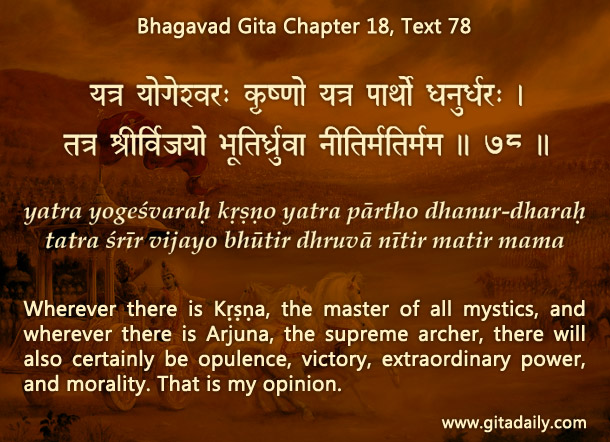In the Bhagavad-gita’s last verse (18.78), the narrator Sanjaya indirectly answers Dhritarashtra’s unspoken question in the Gita’s first verse (01.01). The blind king’s literal question, “What did the warriors at Kurukshetra do?” contains the actual concern: “: “Who will actually win?” Sanjaya responds to that concern with a prophetic assertion: “Where there is the supreme mystic Krishna and the archer Arjuna, there will be victory.”
While this statement foretells the specific victory of the Pandavas in the Kurukshetra war, it also has a universal message. Just as the Gita’s message has both specific relevance to its physical context and universal relevance to all contexts, so does its conclusion. Krishna spoke his message when Arjuna had cast aside his bow in confusion and dejection (01.46). On hearing that message, Arjuna became ready to discharge his responsibility (18.73) and picked up his bow with conviction and determination (18.78).
Arjuna’s bow can be considered to represent our free will. Like Arjuna, our life’s complexities, perplexities and adversities may dishearten and paralyze us. Nonetheless, like Arjuna, if we hear Krishna’s message of love, we too can become energized to face life’s challenges resolutely. Krishna’s words will raise our vision from the negative movements of life-events to the omni-benevolent intention of the Lord who oversees and orchestrates those events. When we focus on striving to act in a mood of loving service to him, we will find a way ahead through the darkest of distresses. Such is the illuminating and empowering result of the loving alignment of the human will with the divine will. Bringing about that alignment is the Gita’s essential purpose and our life’s most fulfilling achievement.
One-sentence summary:
By answering the question of its first verse, the Gita’s last verse reflects the book’s sublime cyclicity; by addressing the universal starting concern, the Gita’s last verse highlights its inspiring message of the transformative power of divine love.
Think it over:
- How does the Gita’s last verse answer its first question?
- How does the Gita’s last verse reflect Arjuna’s transformation?
- How can the Gita’s message help us deal with our life’s challenges?
***
18.78: Wherever there is Krishna, the master of all mystics, and wherever there is Arjuna, the supreme archer, there will also certainly be opulence, victory, extraordinary power, and morality. That is my opinion.
To know more about this verse, please click on the image


persistence powers the target